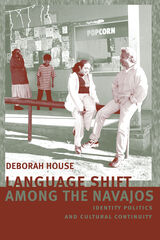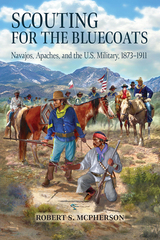2 books about Navajos

Language Shift among the Navajos
Identity Politics and Cultural Continuity
Deborah House
University of Arizona Press, 2002
To experience change on the Navajo Reservation, one need only close one's eyes and listen. Today an increasing number of Navajos speak only English, while very few speak only Navajo. The Navajo language continues to be taught, but it is less often practiced. Deborah House asks why, despite the many factors that would seem to contribute to the maintenance of the Navajo language, speakers of the language continue to shift to English at such an alarming rate—and what can be done about it. Language Shift among the Navajos provides a close look at the ideological factors that intervene between the desire of the Navajos to maintain their language as an important aspect of their culture and their actual linguistic practice. Based on more than ten years of fieldwork within a Navajo institution and community, it points to ideologies held by Navajo people about their unequal relationship with the dominant American society as a primary factor in the erosion of traditional language use. House suggests that the Navajos employ their own paradigm—Sa’ah Naagháí Bik’eh Hózhóón—to learn both Western language and culture and their own without denigrating either perspective. By building on the traditional Navajo belief in harmony and balance, she advocates that those who value the language should use and teach it not just in school but also in the home, in the ceremonial hogans, and among those who cherish their heritage. Now is the time when language choices and behavior will influence whether the Navajo language lives or dies. House's book carries important lessons for anyone concerned with cultural continuity. It is a wake-up call for educators, youth, politicians, or family and community members who value Native language and culture. It remains to be seen in what language that call will be answered.
[more]

Scouting for the Bluecoats
Navajos, Apaches, and the U.S. Military, 1873–1911
Robert S. McPherson
University Press of Colorado, 2022
"With more than twenty books published about the Navajo people, Robert S. McPherson is one of the most prolific contemporary writers concerning their history and culture. Scouting for the Bluecoats addresses a little-known and, until now, undocumented story of an estimated five hundred Navajos employed by the United States Army, primarily in the campaigns against the Apaches between 1873 and 1886. The author takes us with these scouts as they guide U.S. soldiers into the deserts, canyons, and mountains of New Mexico, Arizona, and Northern Mexico; he also provides a solid context about the origin of the Navajos and Apaches, their intertribal conflicts, and their elements of shared culture. Once again McPherson demonstrates his skill as a master historian, his understanding of these people, and a meaningful context for this long-neglected story of warrior-soldiers whose fieldcraft and dedication proved critical in shaping relations between the military and two Indian tribes in the Southwest."
—Kent Powell, Senior historian at Utah Division of State History and editor of Utah State Historical Quarterly (retired)
"Scouting for the Bluecoats examines the important role that Navajos played in military operations during the last quarter of the nineteenth and beginning of the twentieth centuries. Unlike the famous Navajo code talkers of World War II, little has been written about these men who served in some of the most challenging and noteworthy struggles against the Apaches. Until now, their story has been forgotten. Navajo skills in understanding and tracking a wily foe across an inhospitable landscape proved to be essential elements in ending the Apache wars. For those interested in the recruitment and deployment of the scouts, measures taken to counter enemy tactics, and the challenge of obtaining recognition for their service, this book is an invaluable source and a must-read for any serious scholar of Navajo history."
—Ronald P. Maldonado, Tribal historic preservation officer (retired), Navajo Nation
—Kent Powell, Senior historian at Utah Division of State History and editor of Utah State Historical Quarterly (retired)
"Scouting for the Bluecoats examines the important role that Navajos played in military operations during the last quarter of the nineteenth and beginning of the twentieth centuries. Unlike the famous Navajo code talkers of World War II, little has been written about these men who served in some of the most challenging and noteworthy struggles against the Apaches. Until now, their story has been forgotten. Navajo skills in understanding and tracking a wily foe across an inhospitable landscape proved to be essential elements in ending the Apache wars. For those interested in the recruitment and deployment of the scouts, measures taken to counter enemy tactics, and the challenge of obtaining recognition for their service, this book is an invaluable source and a must-read for any serious scholar of Navajo history."
—Ronald P. Maldonado, Tribal historic preservation officer (retired), Navajo Nation
[more]
READERS
Browse our collection.
PUBLISHERS
See BiblioVault's publisher services.
STUDENT SERVICES
Files for college accessibility offices.
UChicago Accessibility Resources
home | accessibility | search | about | contact us
BiblioVault ® 2001 - 2024
The University of Chicago Press









